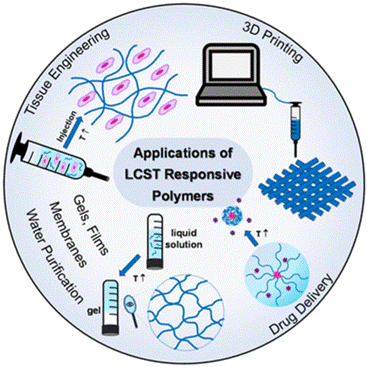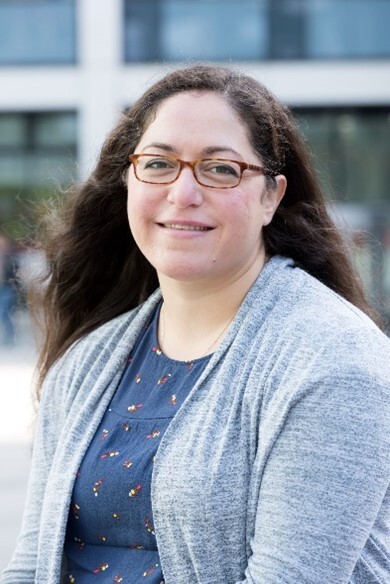The Chemistry Seminar at NU will continue with the research lecture on
"Well-defined polymers: do we really need to control the polymer’s molar mass, composition and architecture?"
by our guest speaker Professor Prof Theoni Georgiou at the Department of Materials, Imperial College London, United Kingdom.
Date: 9 February 2024, 18.00 Astana time
Biographical Information
Prof. Theoni Georgiou is currently a Professor of Polymer Chemistry at the Department of Materials at Imperial College. She obtained a B.Sc. in Chemistry and a Ph.D. in Polymer Chemistry from the Department of Chemistry at the University of Cyprus in 2001 and 2006, respectively. Following her PhD studies, she joined Professor Antonios (Tony) Mikos’ group at Rice University in the USA as a postdoctoral fellow where she gained experience in Biomaterials and Tissue Engineering. In October 2007 she moved to the UK when she was awarded a five-year RCUK Fellowship in Colloidal Nanotechnology at the Department of Chemistry at the University of Hull that lead to a Lectureship in November 2012. In 2014 she joined Imperial College as a Lecturer and she was subsequently promoted in a Senior Lecture (2016), Reader (2019) and Professor (2022). She has been an active member of the scientific community, was a member of the Macrogroup committee from 2017 to 2022 and the chair of the committee from 2019 and 2022. She was also a member of the Materials Chemistry Division Council of the Royal Society of Chemistry and of the European Polymer Federation (EPF) council. In 2017 she was awarded the 2016 Macro Group UK Young Researchers Medal for “contributions to polymer science which show outstanding promise for the future”. She is a member of the advisory editorial board of Polymer International, Polymer Chemistry and European Polymer Journal. Finally, she is an Associate Editor for European Polymer Journal since 2022. Her current research interests lie in the area of polymer chemistry and in particular in designing well-defined polymeric materials and in investigating how the structural characteristics of the polymers affect the material’s end properties and applications with emphasis on bio-applications. She is one of the few world experts in Group Transfer Polymerisation (GTP), a living polymerisation technique that allows the cost-effective synthesis of well-defined polymers and the synthesis of series of polymers with systematically varying structural characteristics. She is mostly known for her work on (i) star polymers for gene delivery, (ii) well-defined covalently linked polymer networks/gels (iii) thermoresponsive triblock copolymers as injectable gels and (iv) polymeric surfactants to stabilise particles and dispersions.
Prof. Theoni Georgiou is currently a Professor of Polymer Chemistry at the Department of Materials at Imperial College. She obtained a B.Sc. in Chemistry and a Ph.D. in Polymer Chemistry from the Department of Chemistry at the University of Cyprus in 2001 and 2006, respectively. Following her PhD studies, she joined Professor Antonios (Tony) Mikos’ group at Rice University in the USA as a postdoctoral fellow where she gained experience in Biomaterials and Tissue Engineering. In October 2007 she moved to the UK when she was awarded a five-year RCUK Fellowship in Colloidal Nanotechnology at the Department of Chemistry at the University of Hull that lead to a Lectureship in November 2012. In 2014 she joined Imperial College as a Lecturer and she was subsequently promoted in a Senior Lecture (2016), Reader (2019) and Professor (2022). She has been an active member of the scientific community, was a member of the Macrogroup committee from 2017 to 2022 and the chair of the committee from 2019 and 2022. She was also a member of the Materials Chemistry Division Council of the Royal Society of Chemistry and of the European Polymer Federation (EPF) council. In 2017 she was awarded the 2016 Macro Group UK Young Researchers Medal for “contributions to polymer science which show outstanding promise for the future”. She is a member of the advisory editorial board of Polymer International, Polymer Chemistry and European Polymer Journal. Finally, she is an Associate Editor for European Polymer Journal since 2022. Her current research interests lie in the area of polymer chemistry and in particular in designing well-defined polymeric materials and in investigating how the structural characteristics of the polymers affect the material’s end properties and applications with emphasis on bio-applications. She is one of the few world experts in Group Transfer Polymerisation (GTP), a living polymerisation technique that allows the cost-effective synthesis of well-defined polymers and the synthesis of series of polymers with systematically varying structural characteristics. She is mostly known for her work on (i) star polymers for gene delivery, (ii) well-defined covalently linked polymer networks/gels (iii) thermoresponsive triblock copolymers as injectable gels and (iv) polymeric surfactants to stabilise particles and dispersions.
Abstract
Well-defined polymers are polymers with controllable and defined characteristics such as molar mass, comonomer composition, 3D architecture (topology like linear versus stars) and position of the monomer groups on the polymer chain. In this talk I will be exploring how these characteristics can affect some aqueous properties of polymers for example their self-assembly and thermoresponsive abilities and in some case their interaction and toxicity with cells. Some examples on applications in drug delivery, tissue engineering and 3D printing will also be explored.
Well-defined polymers are polymers with controllable and defined characteristics such as molar mass, comonomer composition, 3D architecture (topology like linear versus stars) and position of the monomer groups on the polymer chain. In this talk I will be exploring how these characteristics can affect some aqueous properties of polymers for example their self-assembly and thermoresponsive abilities and in some case their interaction and toxicity with cells. Some examples on applications in drug delivery, tissue engineering and 3D printing will also be explored.

Figure 1. Applications of thermos-responsive polymers [1]
Selected References
1. A.P. Constantinou, L. Wang, S. Wang, T.K. Georgiou “Thermoresponsive block copolymers of increasing architecture complexity: a review on structure– property relationships” Polym. Chem. 2023, 14, 223-247.
2. J.S. Correia, S. Mirón-Barroso, C. Hutchings, S. Ottaviani, B. Somuncuoğlu, L. Castellano, A.E. Porter, J. Krell, T.K. Georgiou “How does the polymer architecture and position of cationic charges affect cell viability?” Polym. Chem. 2023, 14, 303-317.
3. A. Li Volsi, F. Tallia, H. Iqbal, T.K. Georgiou and J.R. Jones “Enzyme degradable star polymethacrylate/silica hybrid inks for 3D printing of tissue scaffolds” Mater. Adv., 2020, 1, 3189-3199.
4. A.P. Constantinou, N.F. Sam-Soon, D.R. Carroll. T.K. Georgiou “Thermoresponsive Tetrablock Terpolymers: Effect of Architecture and Composition on Gelling Behavior” Macromolecules 2018, 51 (18), 7019–7031.
1. A.P. Constantinou, L. Wang, S. Wang, T.K. Georgiou “Thermoresponsive block copolymers of increasing architecture complexity: a review on structure– property relationships” Polym. Chem. 2023, 14, 223-247.
2. J.S. Correia, S. Mirón-Barroso, C. Hutchings, S. Ottaviani, B. Somuncuoğlu, L. Castellano, A.E. Porter, J. Krell, T.K. Georgiou “How does the polymer architecture and position of cationic charges affect cell viability?” Polym. Chem. 2023, 14, 303-317.
3. A. Li Volsi, F. Tallia, H. Iqbal, T.K. Georgiou and J.R. Jones “Enzyme degradable star polymethacrylate/silica hybrid inks for 3D printing of tissue scaffolds” Mater. Adv., 2020, 1, 3189-3199.
4. A.P. Constantinou, N.F. Sam-Soon, D.R. Carroll. T.K. Georgiou “Thermoresponsive Tetrablock Terpolymers: Effect of Architecture and Composition on Gelling Behavior” Macromolecules 2018, 51 (18), 7019–7031.
